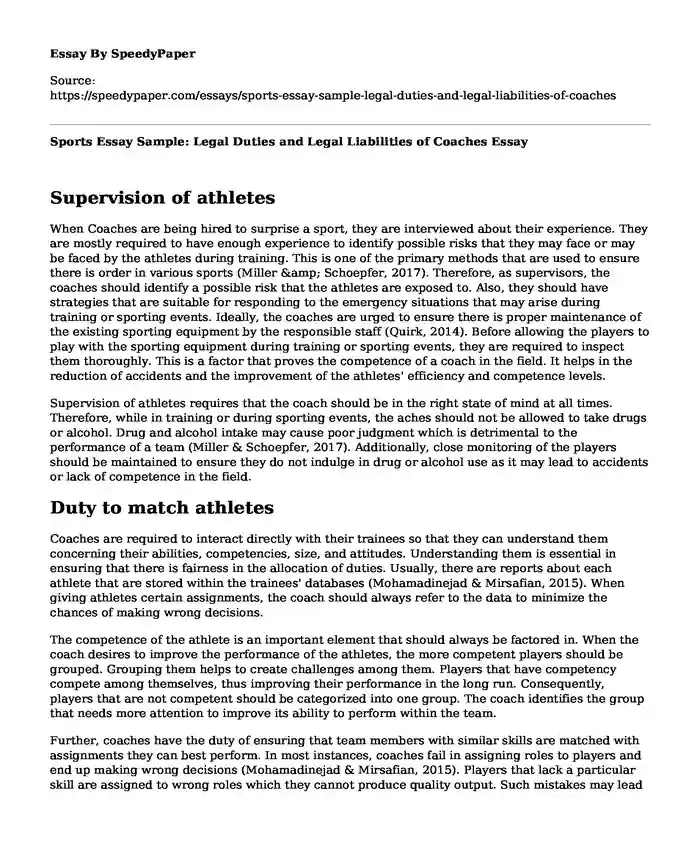Supervision of athletes
When Coaches are being hired to surprise a sport, they are interviewed about their experience. They are mostly required to have enough experience to identify possible risks that they may face or may be faced by the athletes during training. This is one of the primary methods that are used to ensure there is order in various sports (Miller & Schoepfer, 2017). Therefore, as supervisors, the coaches should identify a possible risk that the athletes are exposed to. Also, they should have strategies that are suitable for responding to the emergency situations that may arise during training or sporting events. Ideally, the coaches are urged to ensure there is proper maintenance of the existing sporting equipment by the responsible staff (Quirk, 2014). Before allowing the players to play with the sporting equipment during training or sporting events, they are required to inspect them thoroughly. This is a factor that proves the competence of a coach in the field. It helps in the reduction of accidents and the improvement of the athletes' efficiency and competence levels.
Supervision of athletes requires that the coach should be in the right state of mind at all times. Therefore, while in training or during sporting events, the aches should not be allowed to take drugs or alcohol. Drug and alcohol intake may cause poor judgment which is detrimental to the performance of a team (Miller & Schoepfer, 2017). Additionally, close monitoring of the players should be maintained to ensure they do not indulge in drug or alcohol use as it may lead to accidents or lack of competence in the field.
Duty to match athletes
Coaches are required to interact directly with their trainees so that they can understand them concerning their abilities, competencies, size, and attitudes. Understanding them is essential in ensuring that there is fairness in the allocation of duties. Usually, there are reports about each athlete that are stored within the trainees' databases (Mohamadinejad & Mirsafian, 2015). When giving athletes certain assignments, the coach should always refer to the data to minimize the chances of making wrong decisions.
The competence of the athlete is an important element that should always be factored in. When the coach desires to improve the performance of the athletes, the more competent players should be grouped. Grouping them helps to create challenges among them. Players that have competency compete among themselves, thus improving their performance in the long run. Consequently, players that are not competent should be categorized into one group. The coach identifies the group that needs more attention to improve its ability to perform within the team.
Further, coaches have the duty of ensuring that team members with similar skills are matched with assignments they can best perform. In most instances, coaches fail in assigning roles to players and end up making wrong decisions (Mohamadinejad & Mirsafian, 2015). Players that lack a particular skill are assigned to wrong roles which they cannot produce quality output. Such mistakes may lead to progressive failure of a team in the long run. It is important to ensure that there is a high level of competence in the assigning of roles to players according to their skills. Consultations should be done among the management personnel to ensure that assignments are given to players who are skilled in specific areas.
When young players lay with older players, they may feel uncomfortable. The age factor should always be considered when matching teams. An individual that is below the required age for a certain sport should not be allowed to play with older people. Allowing them could expose them to the risk of being physically injured (Mirsafian, 2016). Therefore, coaches must ensure they match the players according to their ages for optimum performance of a team. Consequently, the older players should not be groups with the young new players. It may derail the progress of the older players who need to spend more time perfecting their skills.
Apart from grouping the athletes into various categories, the coaches should work together with sports administrators to ensure that all the necessary resources are required. Matching the athletes correctly may not be a solution to being competent since there may be mistakes in decision making (Quirk, 2014). Without a conducive environment and the provision of required resource, it is difficult for players to produce quality output. Coaches should also seek the input of other professionals by conducting research or inviting them to vents such as training. For instance, a coach I one team may invite a coach with more experience so that they can share ideas on how to ensure the athletes are best at what they do. These activities require resources which may be provided by the administrator on request.
References
Miller, J. J., & Schoepfer, K. (2017). Legal aspects of sports. Jones & Bartlett Learning.
Mirsafian, H. (2016). Legal duties and legal liabilities of coaches toward athletes. Physical culture and sport. Studies and Research, 69(1), 5-14.
Mohamadinejad, A., & Mirsafian, H. (2015). Connection between the legal knowledge and social background of sports coaches at Iranian universities. Iranian Studies, 48(4), 551-566.
Quirk, C. E. (2014). Sports and the law: Major legal cases. Routledge.
Cite this page
Sports Essay Sample: Legal Duties and Legal Liabilities of Coaches. (2022, Jul 18). Retrieved from https://speedypaper.net/essays/sports-essay-sample-legal-duties-and-legal-liabilities-of-coaches
Request Removal
If you are the original author of this essay and no longer wish to have it published on the SpeedyPaper website, please click below to request its removal:
- Texting While Driving - Free Essay with a Reply to a Paper
- Essay Sample on International Social Work, Indian-based
- Regression and Correlation, Essay Sample on Data Analysis
- Education Essay Sample: Alternative Observation of Teaching Approaches
- Slavery Essay Sample: Narratives Themes in Frederick Douglass Works
- Essay Sample on Examining Joris Luyendijk's Text
- Essay Sample on Good Governance and Economic Growth
Popular categories





